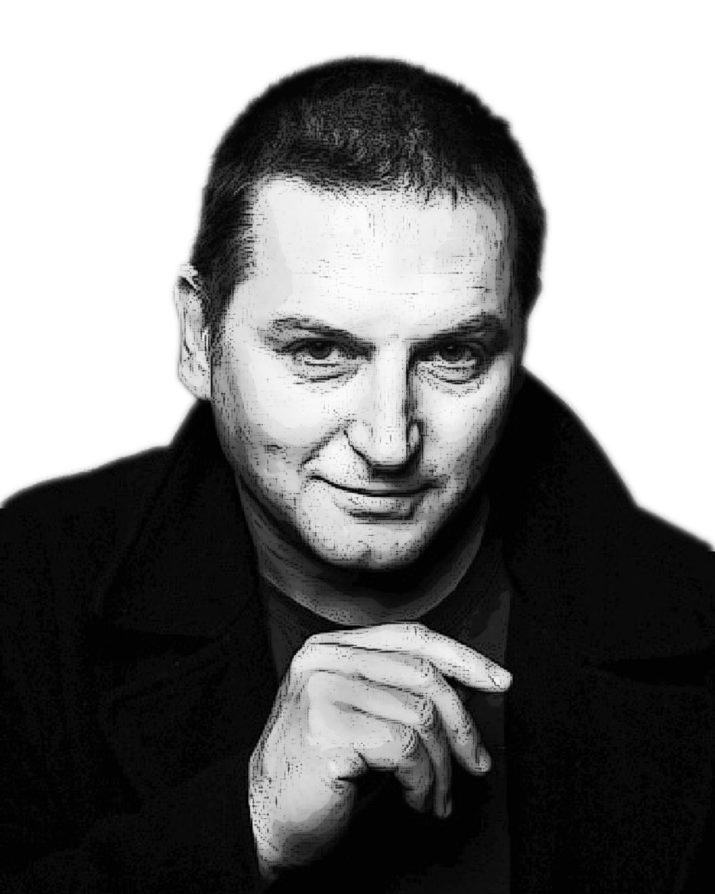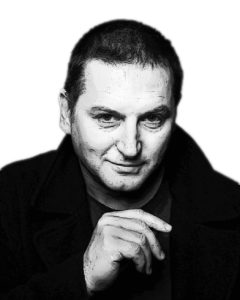

Translated from the Bulgarian by Angela Rodel.
This is part of our special feature on Contemporary Bulgarian Literature.
I don’t believe in Christmas. That was the cold answer from the first of several friends I had called in the secret hope that at least one of them would turn into my Auggie Wren, that they would smile and say: take me to lunch and I’ll give you a real live Christmas story. Who even believes in Christmas anyway, the friend in question fumed, except for a few million scam-happy retailers? It’s the biggest money maker of the year, it’s… an industry holiday, the world’s most powerful ad campaign. You do know who came up with Santa Claus, don’t you? Coca-Cola made him up. Your jolly old St. Nick is nothing but a brand ambassador, hello… hello….
I told him the line was breaking up, that I’d call some other time and hung up. God damn it, all I wanted was a Christmas story.
My attempts with the other two didn’t go much better. One, a person who had recently starting using Orthodox Christianity, told me practically in a whisper that Christmas was mass adoration of idols, of the very golden calf itself, by children. The other, a sound cynic, simply called the jolly old man a kindly pedophile, while that whole business with presents was just a legitimate excuse to bounce some little boy or girl on his knee. Something, which, by the way, has already been outlawed for Santa Clauses in several Protestant countries. Sexual harassment, he concluded, as if he were wishing me a Merry Christmas.
They were right, of course. I slowly walked up Count Ignatiev, one of Sofia’s main shopping streets, past the rosy-cheeked idols doing their belly dances in front of the stores and the shawarma stands near the statue of the Priest, past the stalls full of tinsel and little plastic assembly-required Christmas trees. The light industry that is Christmas was going full steam and if it had suddenly started snowing miraculously at that moment, I would have sworn that it was no miracle whatsoever, but sea foam, a special last-minute sale on artificial snowflakes or the like. Even if Paul Auster himself was in this situation, he’d be hard-pressed to write a true Christmas story. It was clear that we were facing a huge shortage of Christmas stories. The newspapers wanted them, but the writers couldn’t provide – a truly revolutionary situation. And the market needed the fill that niche ASAP. (…)
There was nothing left for me to do but try an old technique for luring stories, which I had used other times as well in hopeless situations.
I walked a little further, bought a newspaper about beekeeping and ducked into the perfect café for hunting stories. I’ll keep the details of the place to myself, so it doesn’t get overrun with hunters and scare off the prey. The important thing is that the tables are relatively close together, the music is very quiet and you can sit there for hours, which is what I would do, as invisible as the sugar bowl and the ashtray. Just an ear, left behind like an old hat. The most important rule of luring stories was not to look like a hunter at all. That’s why I bought that benign newspaper “Bees and Hives,” good-natured in its geezerish way – incidentally, I buy it every season, from what I can tell that’s about as frequently as it comes out. I sat down at the table in the corner, with my back to the whole café, blissfully stretched out my legs, buried my nose in the newspaper and waited. The wintery afternoon sun crawled across the window like a warmed-over fly. I ordered my usual herbal tea. One piece of advice. The inexperienced hunter would order himself a black rum or bourbon, and this very bit of writerly pretention would be his undoing: no scent of a writer whatsoever, the stories immediately get wind of the trap. That’s it for advice. (…)
At that moment right behind my back – the table behind me, I know it well – I heard a line that drowned out the background buzz and make me prick up my ears. Nothing special at first glance, the most usual of expressions, even if it was said in English: Oh, Henry, I’m so happy we’re together…
I was surprised that I hadn’t noticed when that couple came in, I must have been somewhere amidst the hives. The strange thing (besides the English, which wasn’t a standard language for this particular café) was that I didn’t hear Henry’s answer, his reciprocal joy at the meeting. Then the female voice said that even though it had been less than a month, she had gotten so used to these meetings that she couldn’t… Precisely here the waitress somewhat testily unloaded my second tea on the table and I missed the end of the sentence. After that, however, yet another anguished silence followed. This was not a normal conversation. Why wasn’t Henry answering, for Christ’s sake? Perhaps he was angry and silent, or he was whispering quietly? Then it occurred to me that he could be deaf-mute, he could be reading her lips and replying with signs. Yes, yes, the female voice said. Pause. Again: yes – drawn-out and with a hint of melancholy. And then: So we can say “cheers” now, right? I didn’t hear the clink of glasses.
The conversation – if it could be called a conversation at all, carried on as it was solely by her voice – continued with her regret that they wouldn’t be together for Christmas, that it had to be this way and there was nothing to be done, this Christmas was especially important for her mother and she had to stay, but they would talk every day and after that they would never, and I mean never, be apart for more than a few hours.
But when she started describing the café we were sitting in to him, and saying how it was really close to her house, this finally seemed like too much, even for me. Poor Henry, is it not enough that he’s deaf and dumb, now he has to be blind on top of everything? I’ll admit I couldn’t help myself and for the first time I violated my own principle. I slowly turned my head – dark hair in a bob, a splendid neck, pretty shoulder, this Henry is a lucky guy, even though he can’t see his own good luck. I turned just a bit further, trampling all of my hunterly dignity so as to catch a glimpse of her silent interlocutor, but there was no one there. Henry had disappeared into thin air, if he had ever even been there. The woman was sitting by herself at the table behind me, chattering away. She asked what he saw through the window of his bistro, laughed softly, then carelessly pushed her hair back and it was only then that I saw the earphones, the miniature microphone. I mentally apologized to Henry for having chalked him up as deaf, dumb and blind. The phone conversation went on for another two or three minutes. I found out that in New York, where Henry must have been talking from, it was now morning and that this was some ritual of theirs, a romantic date in two places at the same time, in two time zones. The morning and the afternoon came together for twenty minutes. Henry was drinking his first coffee of the day here with her in this smoky café, and at the same time, she was sitting there with him, somewhere in Brooklyn, in front of her last martini of the day (that’s what she was drinking, with two cherries). For a moment I wondered whether in that bistro some Brooklyn-based story hunter hadn’t tuned his ear on a man talking with some invisible silent woman. And whether the ocean, which divided this couple, hadn’t receded and shrunk down to a few drops of water on the table top, spilled by the careless waitress, here or there, it doesn’t matter. And I got a warm fuzzy feeling, Christmassy and sentimental, with a foretaste of miracles, as Gaustin would say. I knew that for a hunter it was unacceptable to be touched and that that was exactly what the story was waiting for so as to bolt off like a doe into the underbrush, lost forever. But in this case I had forgotten that I was a hunter, and the story did something that had happened to me only rarely – it came over to me and gently licked my ear.
Several minutes after the conversation had ended and the woman was likely finishing her martini, I heard her voice again – this time all business, Bulgarian and decisive. She was calling a travel agency and what do you know? A true miracle (as she herself exclaimed) – a ticket through London had opened up at the last minute. And I’ll land in New York on Christmas Eve itself! Reserve the ticket, no matter the cost, I’ll withdraw the money and come straight there – that was the last thing she said. She got up, pulled on her coat on her way out, left money on the bar and sank into the early December dusk.
The thought flashed through my mind – I needed to jump up right away, run after her, catch up with her and tell her to forget about that ticket, because I already knew the end of the story, I knew what the gifts of the Magi could be.
Now this is how things unfold from here: The woman manages to withdraw the money, buys a ticket and takes off the day after next. Before that she explains to her mother why she won’t be with her on Christmas. But not a word to Henry.
He, for his part, when he hangs up the phone, stays in that bistro for a few minutes more and it becomes ever clearer to him that he’ll make a reckless decision for the first time in his life. This very moment he’ll call the airport, then his boss, but first the airport, he’ll work everything out and on Christmas he’ll land in that obscure Balkan capital. And that will be his Christmas present, a complete surprise. Your very first manly step, Henry, he’ll congratulate himself mentally and order a double bourbon. It’s barely nine in the morning, which makes the waitress give him a disapproving glance. But she, too, will part ways with this story, because Henry really seems to have fallen head over heels in love. With an invisible woman on the other side of the earth.
I can see her clearly now, wandering through the New York dusk on Christmas Eve, she finally grabs a cab, gives the address and in less than an hour she is already standing in front of an entryway in Brooklyn.
I can see him perfectly clearly, wandering through the Sofia dusk on Christmas Eve, passing by noisy groups of young people, looking at the slip of paper with an address in his hand and at the strange letters the street signs are written in, he stops someone and asks. Then he sees the café that was described to him a few days earlier, where he had been a few days earlier, it seems. And he decides to sit down, to call her from there and to tell her that he is waiting in the café across the street. She won’t believe it, of course, but…
But now there are still three days until Christmas. The only thing I know for sure is that on Christmas Eve I will wait here. And if after the second cup of tea a happy and flustered young man sits down on the table behind me, dials a number and says: This is Henry, my love… And with completely feigned nonchalance announces that he is waiting for her at the café across from her place, she will only have the strength to say: Oh, Henry… that means that Christmas stories really do come true after all. Even if they are stories about missed connections. In this missed connection there is more love than in all the meetings in the world, if that doesn’t sound too sentimental for you. But that’s allowed on Christmas. Isn’t it, O. Henry?
Georgi Gospodinov (1968) is Bulgarian poet, writer and playwright. His debut novel, Natural Novel, was published in more than 20 languages. The next one, The Physics of Sorrow, won the international Jan Michalski Prize 2016 and was shortlisted for the American PEN Translation Prize, Best Translated Book Award, Premio Strega Europeo, etc. The novel has received praise from The New Yorker, World Literature Today, etc. He is author of scripts, an opera libretto and two theater plays. Blind Vaysha, a short animation based on his short story (dir. Teo Ushev), was among the Oscar nominees, 2017. Gospodinov is in NYC as a Cullman fellow at the New York Public Library, 2017/18.
Angela Rodel is a literary translator. In 1996 she was awarded a Fulbright Fellowship to study Bulgarian at Sofia University. She returned to Bulgaria on a Fulbright-Hays Fellowship in 2004 and now lives in Sofia. In 2010, she received a translation grant from the American PEN for Holy Light, a collection of stories by Georgi Tenev.
Published on December 6, 2017.




